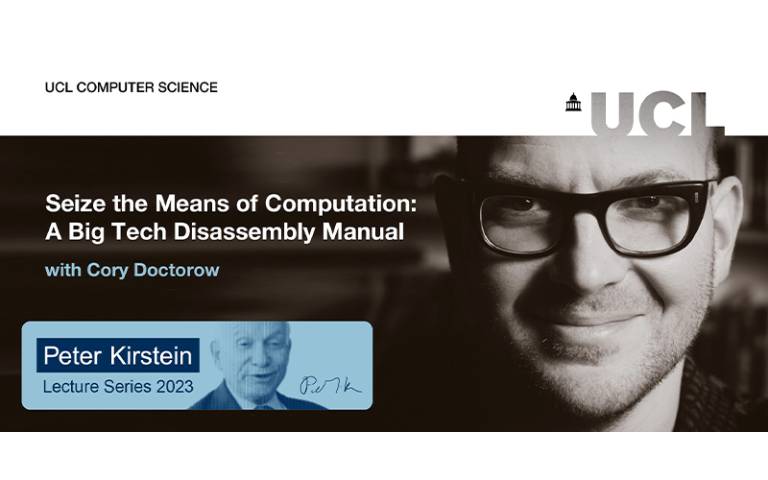Peter Kirstein Lecture Series 2023 - Seize The Means of Computation: A Big Tech Disassembly Manual with Cory Doctorow
Abstract
We're paying way too much attention to making Big Tech better, and not nearly enough attention to making it *smaller*. After all, nobody's perfect - especially a multinational corporation hoping to craft speech rules governing 3 billion people speaking 1,000 languages in 100 countries - and that means that giant services are bound to make colossal mistakes with stupendous consequences.
Making Big Tech smaller starts with making it easier to leave. Interoperability is the techbuster's secret weapon. With interop, uses can leave Facebook without cutting ties to the people who stay; or switch mobile OSes without losing their apps, data and media; or change e-readers without losing their books.
Big Tech isn't going to give us interoperability - we have to take it. Crafting regulations that Big Tech can't cheat on is hard - harder still is making policies that new kinds of tech services - small businesses, co-ops, nonprofits - can also comply with.
It's hard, but it's not impossible. What is impossible though, is making Big Tech fix itself. The answer to the machine is never the machine. Rules forcing Big Tech to police its users can only work if Big Tech never gets too small to do that policing.
Interoperability is tech liberation's secret weapon, the key to technological self-determination and a better future. We don't need better Zucks and Musks - we need to abolish them!
Cory offers his insights into these questions based on his diverse career working as a science fiction author, activist, and journalist

About the event
UCL Computer Science had the pleasure of hosting the 4th edition of the annual Peter Kirstein Lecture series. The lecture took place at UCL Cruciform Lecture Theatre on Thursday 1st June 2023 as a hybrid event.
We were delighted to have Cory as this year's guest speaker. The lecture was introduced by Professor Steve Hailes, Head of Department at UCL Computer Science, along with Dr Igor Gaponov, Associate Professor of Robotics and AI. The Q&A was led by Dr Alex Li , Associate Professor in Robotics & Machine Learning, and the panel was chaired by Dr Leonie Tanczer, Associate Professor in International Security and Emerging Technologies and UKRI Future Leaders Fellow, all of whom co-created the programme for the day.
The lecture and Q&A were followed by a panel discussion where we were privileged to be joined by experts in the field of law and policymaking in the tech area.
A Vote of Thanks was extended by Professor Steve Hailes.
The lecture and panel event was followed by an afternoon tea reception and book signing.
Panelists
Cory Doctorow | |
 | Cory Doctorow (craphound.com) is a science fiction author, activist, and journalist. His latest book is Chokepoint Capitalism (with Rebecca Giblin) nonfiction about creative labour markets and monopoly. His latest novel is Attack Surface, a standalone adult sequel to Little Brother. He is also the author How To Destroy Surveillance Capitalism, nonfiction about conspiracies and monopolies; and of RADICALIZED and Walkaway, science fiction for adults, a YA graphic novel called In Real Life; and young adult novels like Homeland, Pirate Cinema and Little Brother. His first picture book was Poesy the Monster Slayer (Aug 2020). |
Francine Bennett | |
 | Francine Bennett is Interim Director of the Ada Lovelace Institute, covering Director Carly Kind’s maternity leave in 2023, and she has been a founder member of the Institute’s Board since 2019. Prior to joining Ada, Francine was VP of Data at Healx, a biotech company which uses AI to find treatments for rare diseases; cofounder of Mastodon C, a data science consultancy that supports local and central government to realise the social and business potential of their data; and was a founding trustee of DataKind UK, which provides data science support to UK charities. She is also currently a member of the Gambling Commission’s Digital Advisory Board and the Advisory Council of the British Library. |
Sylvie Delacroix | |
 | Sylvie Delacroix is a professor in law and ethics at the University of Birmingham and a fellow of the Alan Turing Institute. Her interest in the infrastructure that molds our habits notably leads her to pay attention to the power imbalances that stem from our increased reliance on data-reliant tools. As a concrete way of mitigating the latter, she co-chairs the Data trust Initiative. Her latest book -Habitual Ethics? Was published by Bloomsbury in August 2022. @SylvieDelacroix |https://delacroix.uk |
Neil Ross | |
 | As Associate Director for Policy Neil leads on techUK's policy development in the UK. In this role he regularly works with UK and Devolved Government Ministers, senior civil servants and members of the UK’s Parliaments with the aim of helping to make the UK the best place to start, scale and develop a tech business. Neil joined techUK in 2019 to lead on techUK’s input into the UK-EU Brexit trade deal negotiations. He acts as a spokesperson for techUK in the media and at Parliamentary Committees. Neil was listed by the Politico newspaper as one of the 20 people who matter in UK tech. |
Emma Wright | |
 | Emma Wright is a Partner and leads the tech, data and digital team at law firm Harbottle and Lewis where she advises companies on the contractual frameworks underpinning digital transformation programmes both for customers across a broad range of industries and suppliers and acts as regulatory counsel to the tech and digital sectors including cybersecurity, online safety, AI strategies, risks and opportunities. She is externally recognised as a leading practitioner in technology and telecoms law and is listed by Computer Weekly as one of the most influential women in tech. She also sits as a Non Executive Director of Playfinder, a tech scale up. She is also Counsel and Director at the Interparliamentary Forum on Emerging Technologies. Emma is part of the newly formed UNESCO Women 4 AI panel of global experts and is currently working with Unesco on the implementation of the UNESCO Recommendation on AI Ethics in several countries in the Global South. The Recommendation supports the UN's sustainable development goals. She is a regular external speaker and has presented in China and Mexico. |
 Close
Close

